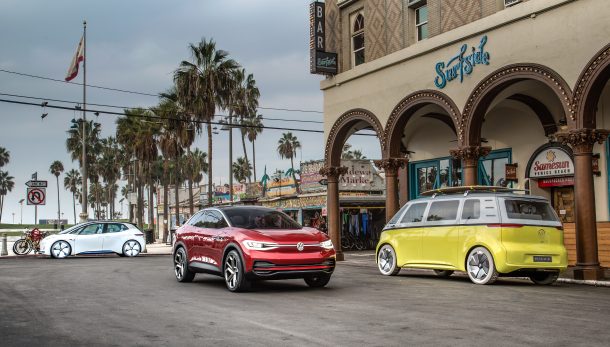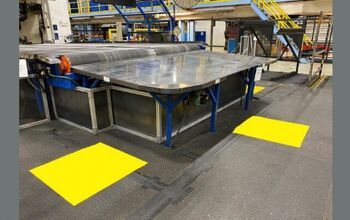Volkswagen's Not Ruling Out an Electric Tie-up With Ford

Pretty much everything is on the table at this point. At least, that’s the way it looks to industry observers. The partnership announced between Ford and Volkswagen back in June has the potential to birth any number of outcomes — from jointly developed commercial vehicles (the initial aim), to badge-swapped overseas small cars, autonomous vehicle hardware, and perhaps even borrowed electric vehicle architecture.
As it prepares the launch of its MEB-platform electric vehicles, Volkswagen’s not saying “no” to letting Ford have a piece of the action.
Of course, it’s not saying “yes” either. Speaking on a conference call Tuesday, Volkswagen chief financial officer Frank Whitter said the company is open to new hookups, Automotive News reports, but wouldn’t say whether or not its MEB architecture would ever be up for grabs.
“Whether we might provide access to other brands outside of the VW Group is theoretically possible, but there is no decision,” Whitter said.
Having access to VW’s EV architecture would be a cost-saving boon for Ford, which begins its electric product push with the release of a sporty crossover in 2020. At this year’s Detroit auto show, Ford announced plans to release 40 electrified models by 2022, 16 of which would be fully electric. To do this, the automaker will spend $11 billion.
VW’s first MEB vehicle, a compact hatchback, starts production in November 2019. Following that, a crossover and reborn Microbus appear, with production eventually leaving Germany for the U.S. and China. Those latter two models likely have a home in Tennessee.
All told, VW aims to build 10 million electric vehicles using its new architecture. One of the brand’s main areas of focus is the Chinese EV market — a cash-rich cornucopia of state-incentivized green vehicle buyers. It’s a market Ford, which saw its Chinese operations hit a towering roadblock in recent months, would definitely like a larger slice of.
Platforms aside, Whitter said VW is eagerly looking to lower future costs by partnering with big players in the autonomous driving field.
“It’s no secret that this is very expensive to develop and that there is the one or the other that is far ahead, such as Waymo in the U.S., so we are naturally thinking about how we can narrow the lead. Or if this isn’t feasible, how we can strengthen our own activities,” Whitter said. “There’s no final decision.”
[Image: Volkswagen]

More by Steph Willems
Latest Car Reviews
Read moreLatest Product Reviews
Read moreRecent Comments
- Master Baiter If you rear-end someone, it's your fault, period. If motorcycles need more time to stop, then riders need to increase their following distance.
- Master Baiter Until recently, virtually every cell phone and computer was made in China and no one seemed to care. The majority are still built there. I'm not a fan of tariffs as it just gives domestic makers a price umbrella to sell their garbage products to U.S. consumers at higher prices.
- Teleedle It would seem that if the Chinese made cars and trucks are ready to compete on the world market that they should be able to compete without the need for government help through subsidies. That's never going to happen with the mindset of their leadership. The rate at which they've transferred the ability to copy to the rate of their abilities to innovate isn't really astounding, but it is truly indicative of their inherent abilities to see through problems and overcome without a lot of fuss. They just have a different way that seems to continually baffle the Western mind. It only goes back a few thousand years. The rest of the world just has to catch up... Without tariffs, three Seagulls could be bought for the price of one loaded Toyota Corolla. I would settle for a nice small pickup truck that can get 30-35 mpg, if the Chinese want to build something with real durability and value. I'm sure they can do that for about $10-12k US, too, dumping them all the way to the bank. Neither Trump or Biden or Bugbrain want that, though. Restrictive 'targeted' tariff ideas indicate that they all want protectionism and the Chicken Tax to continue. The price of living in freedum in the non compete world... and the hallmark of one upmanship by the political class towards more and more expensive transportation related needs. All costs are ALWAYS passed onto the end consumer. Tariffs are the burden of the extra cost. Tariffs are punitive, remember... as intended. The political class is still living off the backs of their constituents throughout the world... same as it ever was.
- Theflyersfan One day, some of these sellers will come to the realization that cars are not houses and putting expensive upgrades into one doesn't equal a higher selling price down the road. $29,000? The only Challenger that has a chance of value down the road, and only with low miles, is the Hellcat.
- SaulTigh The Cyclone engine was really powerful, but with a fatal flaw. Ask me how I know.

































Comments
Join the conversation
"Electric tie-up"? And I thought Bertel Schmitt had moved on.
The Tesla Effect: An Elon Musk Adventure